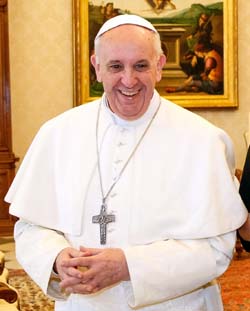This is important: to get to know people, listen, expand the circle of ideas. The world is crisscrossed by roads that come closer together and move apart, but the important thing is that they lead towards the Good. (Pope Francis)
|

|
Canon Law 212 calls upon the laity to speak up:
2 - The Christian faithful are free to make known to the pastors of the Church their needs, especially spiritual ones, and their desires.
§3. - According to the knowledge, competence, and prestige which they possess, they have the right and even at times the duty to manifest to the sacred pastors their opinion on matters which pertain to the good of the Church and to make their opinion known to the rest of the Christian faithful, without prejudice to the integrity of faith and morals, with reverence toward their pastors, and attentive to common advantage and the dignity of persons.
|
